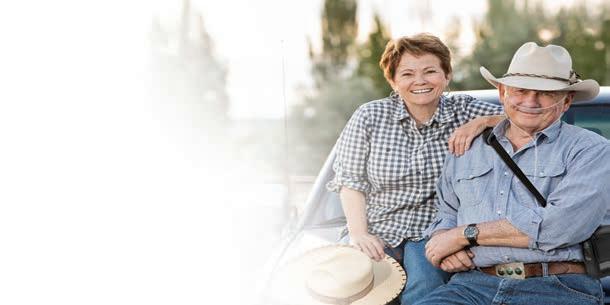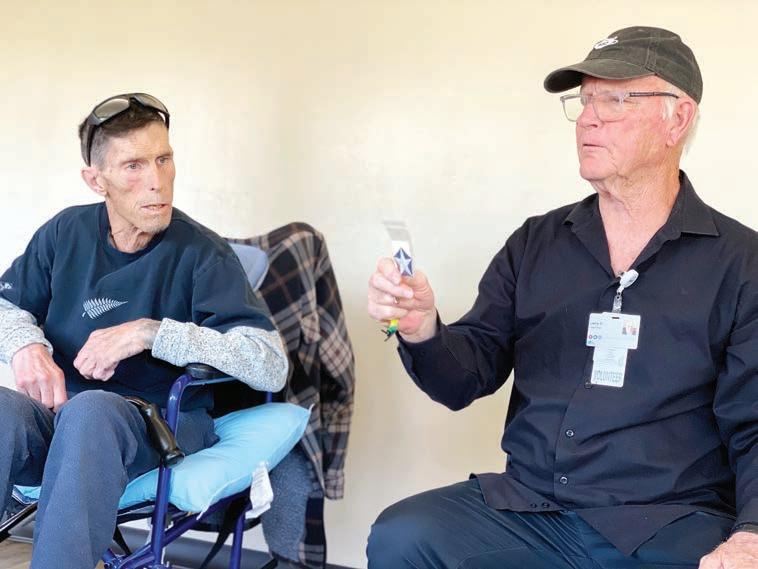
7 minute read
Hospice provider and shelter honors homeless veteran for service
BY TAYLER SHAW TSHAW@COLORADOCOMMUNITYMEDIA.COM
Although he woke up in pain, George Daniel Read said he spent the morning at Rocky Mountain Refuge for End of Life Care trying to make himself presentable, shaving his face and sporting a new haircut.
It was a big day. A ceremony to honor Read, who has cancer and is receiving hospice care, was planned for that afternoon to recognize his time serving in Vietnam as a Marine. e ceremony was a combination of e orts by TRU Community Care, a health care organization providing hospice care to Read, and the Rocky Mountain Refuge, where he is currently staying after becoming unhoused about two years ago.
“Hospice care in our country is designed to be in your home with your family assisting,” said Brother James Patrick Hall, the executive director of Rocky Mountain Refuge and a friar with the Brotherhood of St. Gregory. “And if you don’t have either one, there’s not much for you to go to.”
Hall said Rocky Mountain Refuge is a specialized shelter that o ers around-the-clock custodial, familystyle care for unhoused people who are on hospice.
“ e hospice organizations do the hospice care. We do what a family would do,” he said. “People come to us. We take care of them until they pass.”
TRU Community Care has veteran volunteers who o er services such as companionship and pinning ceremonies for veteran patients receiving end-of-life care.
For Read, it was a smaller ceremony held in the sunroom of the Denver Rescue Mission’s building, e Crossing, where the Rocky Mountain Refuge is also housed.
Larry Sturgeon, a veteran volunteer for TRU Community Care who also served in Vietnam, presented to Read several items including a framed certi cate in his honor, a Vietnam bead set, a star from an American ag and a ag pin.
“Today, we honor Daniel for his service to our country,” Sturgeon said. “On behalf of a grateful nation, sta and volunteers at TRU Community Care, thank you for your military service to the United States of America and for advancing the hope of freedom and liberty for all.”
At the end of the ceremony, Read said, “I’m proud to be an American and I’m proud to be a Marine.
“And I’m proud to be able to serve not only you people but other people like you.”
Turning memories into stories
TRU Community Care is one of the hospices involved in the National Hospice and Palliative Care Organization’s “We Honor Veterans” program that was created in collaboration with the Department of Veterans A airs.
“ e VA (Veterans A airs) does not provide hospice. e VA does palliative (care). And so if veterans on service with them need hospice care, they need to … utilize community partners,” said Becki Parr, a volunteer coordinator with TRU Community Care who oversees the organization’s We Honor Veterans community outreach.
Parr said Veterans A airs formed a partnership with the National Hospice and Palliative Care Organization so that hospice partners could be educated on what a veteran may need.

“For instance, if a veteran was in combat, they might not speak of it. It might not be something that they share,” she said. “At (the) end of life, as they are reconciling with things, the whole of their story, they need a space to be able to share that story.”
One of the e orts of the We Honor Veterans program is getting veteran volunteers like Sturgeon so that when there is a veteran patient, there can be someone to listen to their experience, Parr said.
“Sometimes there is somebody who won’t share something with their daughter or son but would share it with someone else who also served,” she said. “It’s been powerful.”
During his time in service, Sturgeon said he worked at the Camp Zama Hospital.
“We were the hospital to which the majority of the injured veterans were sent,” he said. “I worked in the laboratory there.”
As a veteran volunteer, Sturgeon makes it a point to ask veterans what their experience was like, as he said veterans can sometimes struggle with talking to themselves.
“But we’re really good at talking to each other,” he said.
When veterans share their experiences, their memories become stories, Sturgeon said.
“ at’s part of what I’m trying to do is … to turn those memories into stories. And stories have power,” he said.
Part of the purpose of the ceremonies is to ensure that all veterans know “that we still remember them,” Sturgeon said.
“We’re honoring the veterans, not the war, not the politicians who sent them to the war,” he said. “We just want them to know that we remember. And perhaps, as important, we want their family to know that they’re genuine American heroes.”
Expressing a similar sentiment, Parr said, “We honor the person whether or not we agree with the politics.”
In the military, if a person is given an order, they are expected to follow it without question, Parr explained.
“Sometimes, people are asked to do things that might make them have to compromise morally, and that’s called a moral injury,” Parr said. “ ose are things, too, that we want to create space for people to share.”
In addition to serving patients, TRU Community Care aims to educate the community on what happened with Vietnam veterans and how they were — or were not — welcomed home after their service, she said.

“Some of them were really never welcomed home. ey took o their uniforms and tried to disguise themselves as non-military as soon as they could.
“And … that’s not every Vietnam veteran’s story, but it’s enough,” Parr said, explaining part of the ceremony is saying ‘welcome home’ to the veteran. “ ere have been many times when I’ve gotten to witness Larry (Sturgeon) welcoming someone home and there’s been tears in the person’s eyes.”
“ e biggest thing, I think, that I’m taking away from this work is to listen to the individual story and not make any kind of assumptions,” Parr continued. “Be willing to listen in a non-judgmental way to the story of another person and honor the person.”
‘I am approaching the end of my life’
Around the age of 16, Read, who is now in his mid-60s, said he got into some “trouble” and faced a choice: go to prison or enlist in the military.
VETERAN
FROM PAGE 12 we could provide would be so much more,” he added.
He chose the latter and said he enlisted into the Marine Corps, serving from roughly 1974 to 1976.
“It was (a) totally di erent world,” he said about coming back after serving in Vietnam.
‘The need is definitely there’ e length of stay of a person always varies. storage and residential room with one bed, Aguilar said.
Rocky Mountain Refuge describes its mission on its website as o ering “a digni ed alternative to dying alone on the street for those with terminal illness” by providing a place for unhoused people to live out their nal days.
While the hospice agency partners provide nursing and physician services, the sta and volunteers at Rocky Mountain Refuge provide care such as companionship and cleaning services, per the website.
To his knowledge, Hall said Rocky Mountain Refuge is one of four facilities in the country that does this type of work.
1, 2021, and June 30, 2022.
According to the report, 2,134 veterans accessed services related to homelessness in the same time period.
“ e need is de nitely there, and the list is expanding of the people that want and need services. But we are very limited in our space,” Aguilar said.
Rocky Mountain Refuge currently has the capacity to serve up to three people at a time, he said, and the organization has a waiting list of at least four to ve people at all times.
“We’ve had people come and pass away (on the) same day, and we’ve had people stay a few months,” he said.
Buskey explained the challenges that can arise when two people, who may have di erent terminal illnesses and may be at di erent stages, have to share a room.
“We want a facility with individual rooms so we could provide comfort care, and so that the other person doesn’t feed o of what the other person is going through and anticipating what they’re going to eventually go through,” Buskey said.
In the meantime, the shelter continues to serve the people it can.
“We don’t care about your gender identity, your orientation, your legal status — any of that,” Hall said. “We just take care of folks.”
Read got connected to TRU Community Care, which is a hospice partner of Rocky Mountain Refuge.
“Hospice called us and said, ‘We have an unhoused person.’ And we didn’t know he was a veteran at rst,” said Executive Director Brother James Patrick Hall about how Rocky Mountain Refuge got connected to Read. Read has been staying at the Rocky Mountain Refuge since February. “ ese people are incomparable. ey help me out immensely,” he said. “Timisha, she’s incomparable. She helps me out any way she possibly can.” e issue is not singular to Read, as Program Manager Robert Aguilar said a lot of the people Rocky Mountain Refuge serves show up without any sort of identi cation. e lack of identi cation can prevent the person from accessing programs and bene ts such as social security and food assistance programs, Aguilar explained.
Timisha Buskey is the o ce manager for Rocky Mountain Refuge. She said Read is the rst client she has seen where hospice has helped him. “He didn’t spiral down from hospice, so we’re actually talking about, in August, him transitioning. But we’re not going to put him out without him having bene ts in place so that he doesn’t end up back here in a homeless situation,” she said, explaining that the goal is to get Read a place to stay at a Veterans A airs housing location where he can live in his own unit but still receive care.
One of the di culties is that Read lost his identi cation, which Hall said has Read’s veteran status on it. “Rightly so, he wants that back. And we’ve been really struggling to get that back,” Hall said.
“A big trouble that we’ve got whenever (we are) coordinating transportation from … hospitals is making sure they have all their documentation or personal belongings with them whenever they’re being transported,” he said.
“ at’s so di cult because we’re trying our best to provide the most comforting and e cient care for them,” Aguilar said. “We’re doing the best we can but it’s only so much that we can do.”
“If we had those things, the care e Metro Denver Homeless Initiative’s 2022-2023 State of Homelessness report said the Homeless Management Information System showed 27,860 people accessed services related to homelessness between July








